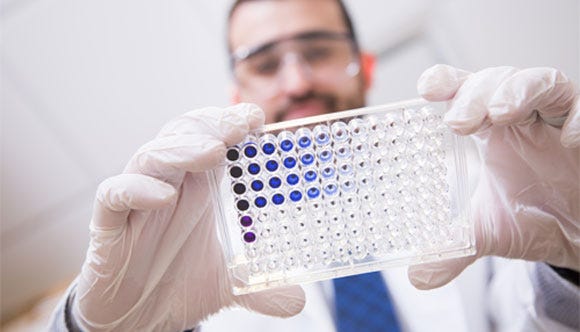New Degree ‘A Shot in the Arm’ for Pharmacogenomics
 Assistant Professor of Pharmacy Practice Thomas Smith conducts research in the pharmacy lab.
Assistant Professor of Pharmacy Practice Thomas Smith conducts research in the pharmacy lab.
Subscriber Benefit
As a subscriber you can listen to articles at work, in the car, or while you work out. Subscribe NowA small liberal arts school in northern Indiana says it’s blazing a trail in pharmacy education. Manchester University is the first school in the nation to launch a master’s degree program in pharmacogenomics, the study of how genes affect a person’s response to drugs. Program developers says the degree is the perfect antidote to a void in the health care industry.
Pharmacogenomics is a relatively new field that merges pharmacology (the science of drugs) with genomics (the study of genes and their functions). Also called precision medicine, it’s uncovering why a drug that works for one person may, for example, cause an adverse reaction in another individual with the same disease.
“Getting the right drug to the right patient early on in therapy—that’s one of the tenets in this area, to do exactly that, and do it precisely,” says Manchester Department of Pharmaceutical Sciences Chair David Kisor.
He believes the completion of the human genome project, coupled with the development of technology to quickly analyze a person’s DNA, “opened up a whole new world.” He says many in the burgeoning industry have bachelor’s degrees in biology or chemistry, but lack formal training in pharmacogenomics.
“We see an increase in the number of genetic testing companies and a lack of individuals who are educated to go work at those companies,” says Kisor. “That’s where the hole is; people who can take an individual’s sample, analyze it with advanced technology, get the results, and interpret and provide it in an actionable form to clinicians.”
Kisor says there are plenty of major universities with PhD programs focused on specific therapeutic areas, such as cancer or cardiovascular pharmacogenomics, but the small private university is focusing on giving students a broader knowledge base. He describes many in the pharmacogenomics field now as “self-taught.”
“It’s that new. It wasn’t until a little while ago that the Accreditation Council for Pharmacy Education made it a requirement for pharmacy schools to even have [pharmacogenomics] in their curriculum,” says Kisor. “I think pharmacogenomics programs like ours are coming, but we had an opportunity to lead in this area and not be following. I think it speaks to the vision of the university.”
Precision medicine is currently having the most dramatic impact in psychiatry and cancer. Psychiatric drugs take longer to show their effectiveness in a person; if the correct drug can be identified early in therapy, Kisor says treatment can be drastically improved. Similarly, Kisor notes a study several years ago revealed that approximately 75 percent of cancer patients don’t respond to the initial medication prescribed.
“Cancers tend to change their genetics all the time; that’s what makes them so difficult to hit. The technology is there to look at things more rapidly, almost to the point of real-time. The ability to react to changing genetics in a cancer can help dictate therapies that could be used to target these genetic changes.”
Kisor contends prescribing the correct drug early in treatment is not only what’s best for the patient, but also decreases overall health care costs by avoiding adverse reactions that cause a medical bill snowball effect.
The university plans to expand the program in the coming years, offering education for other professions, such as genetic counselors, who need genetics training but not pharmacology. Kisor believes the current curriculum—aimed at training pharmacogenomics generalists—is just what the doctor ordered for an industry hungry for professionals with the expertise.
“This is a very unique time in science and medicine. We’ve not been here before, so [Manchester] wanted to be first,” says Kisor. “I wish I was 30 years younger so I could see how this is going to eventually positively impact our society and the world’s population health-wise. I can’t imagine we’ll have this kind of event in our history happen again.”
Kisor says the emergence of pharmacogenomics is reminiscent of an earlier trend in the industry.
Kisor says, until the potential of pharmacogenetics is fully realized, doctors will rely on a variety of factors to make their best guess at what drug will work best for a patient.
